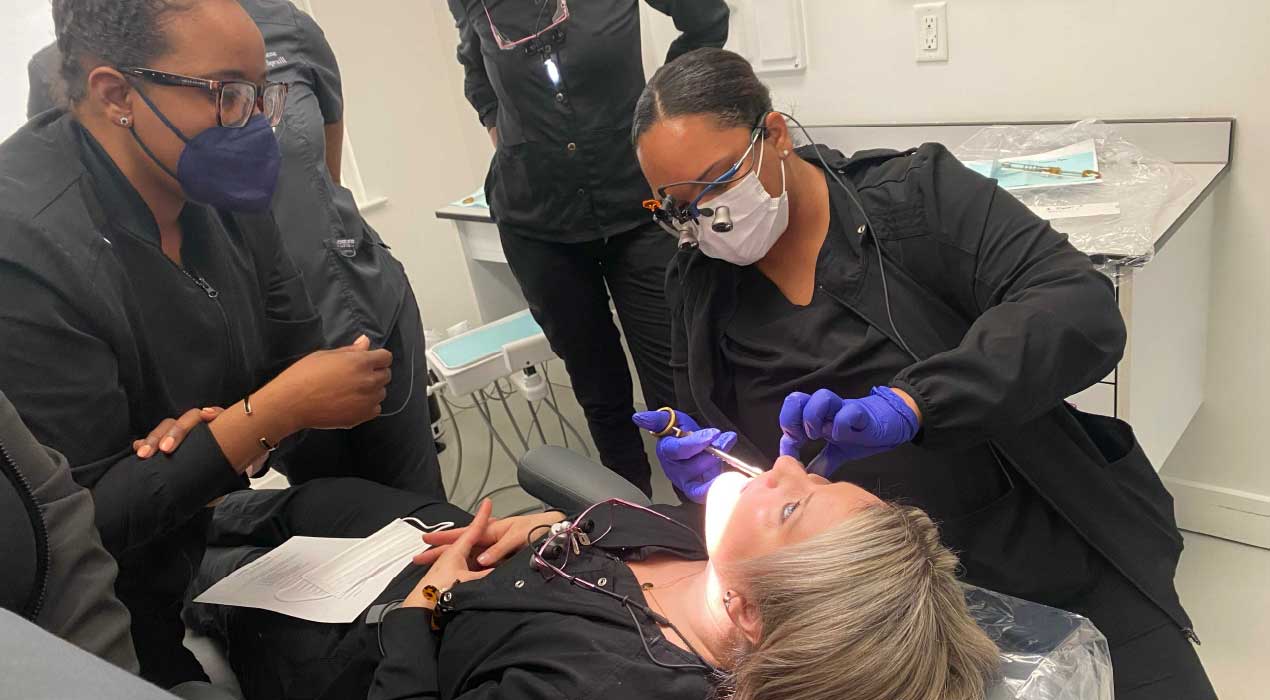All Smiles: Department of Dental Hygiene to begin training students in administration of local anesthesia
(June 18, 2024) - Clayton State University is one of only two institutions in Georgia to offer a bachelor’s degree in dental hygiene.

And those currently leading Clayton State’s Dental Hygiene program believe that a degree from the university in their field of study is about to become even more valuable.
In Spring 2024, several of the program’s faculty and instructors became board certified in the state of Georgia to educate and train students in the administration of local anesthesia to patients in need.
Dr. Naquilla Thomas, chair of Clayton State’s Dept. of Dental Hygiene, said that in 2023, “Georgia joined 48 other states that currently permit dental hygienists to administer local anesthesia” and is ecstatic to begin training students how to do so in Summer 2025.
“Times are changing for the better,” Thomas said. “The special practice of administering local anesthesia helps facilitate comfort and care when treating patients with chronic gum disease. It leaves patients feeling numb, allowing for improved comfort.”
Thomas added that the state of Georgia requires a dentist “to be in the area or direct supervision” of students upon their training in the practice.
In the updated curriculum, students will have to participate in 30 lecture hours as well as 30 combined lab and clinical hours in order to receive their certifications and degrees.
“Over two years in the program, they're going to have a minimum number of injections that they have to perform on patients,” Thomas said. “These skills require not only the [knowledge of] injections; they have to be prepared for adverse events related to these injections.”
Thomas believes that under the university’s new curriculum, Dental Hygiene Lakers will be more equipped and ready to respond to those in need than in years’ past.
Upon graduation, the program chair says that graduates will be “equipped to perform their duties at the highest level of scope of practice in Georgia as dental hygienists.”
She and her fellow instructors are “confident in their success.”
“They're going to be fully, bountifully rewarded and ready for employment upon graduation,” Thomas said. “We’re preparing ourselves for them to be great.”
Asst. Prof. Heather Eddy also shares in Thomas’ enthusiasm.
Although she admitted to being “initially anxious” while administering anesthesia during her certification training, she believes students will “feel the same sense of accomplishment” once completing their own training, as well.
“Our students will benefit from learning this important skill, not only by receiving invaluable hands-on clinical experience during their education, but by building their confidence in the controlled educational setting,” Eddy said. “Earning this skill allows for an expanded scope of practice in our profession and the continuity of patient care.”
For Dental Hygiene juniors who just returned to their summer classes, the news that such training will be added to their education before graduation may be exciting, but still somewhat intimidating.
First-year Clinic Course Director Kimberly Pyron advised any who may be nervous to “trust themselves,” as they have already learned the necessary skills to administer local anesthesia to all patients in the university’s Dental Health Clinic and beyond.
“Being able to administer anesthesia is so rewarding,” Pyron said. “It makes the day go smoother because we don’t have to stop and wait for a doctor to come and administer anesthesia. Patients trust hygienists and many prefer for us to administer.”
Clinical Instructor Brandi Clisham said that while patients will certainly be positively impacted, the impact that students will feel from the new curriculum will be unprecedented.
She believes that once graduates have earned their certification to practice administration of local anesthesia, the doors will be wide open for Lakers once they have begun their professional careers.
“Being one of two Georgia schools that offer a bachelor’s degree [in dental hygiene] puts us ahead, as it allows our students to do so much more than clinical practice,” Clisham said. “They can go into education, research, sales, advertising – the list goes on. Having the local anesthesia certification on your resume just adds to the marketability for our students to effectively obtain employment around graduation.”
And the impact won’t simply stop with Clayton State students and graduates.
Clisham further added that the goal of the program is to “provide optimal oral care” to the university’s local community, which she knows can often include sensitive and nervous patients.
Her fellow instructor, Mrs. Metoqua Anderson, further believes that the treatment provided by the university’s Dental Hygiene Clinic will also be more effective when patients are more comfortable.
“Making sure our patients are comfortable is vital when providing dental care,” Anderson said. “Our graduates will have the ability to provide care to their patients when they are experiencing discomfort without waiting for the dentists. This improves the hygienist’s ability to build trust with their patients and work efficiently.”
Alongside her peers, Thomas is “all smiles” and overjoyed by the prospect of where Clayton State’s Dental Hygiene program is headed moving forward.
From impactful training received at the highest level by its faculty to the growing presence in Clayton County and south metro Atlanta, she believes the future is bright for all who come to Clayton State University seeking a degree in Dental Hygiene.
“In the long run, we're looking at not only the success of the students, but of employability and marketability,” Thomas said. “Having these advanced skills and training, a Clayton State student is going be successful in their employment, which in turn is going to continue to make things better economically for our country and state. This is a big deal from an individual, local, and community-wide aspect in terms of care and improvement in care.”
